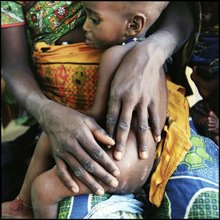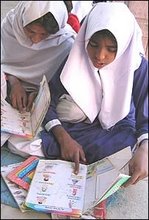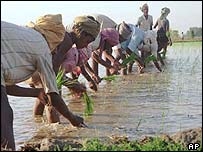WASHINGTON, June 30, 2009. On the eve of the 20th anniversary of World Population Day, the World Bank and the United Nations Population Fund (UNFPA) warned that family planning and other reproductive health programs vital to poor women had fallen off the development radar of many low-income and donor country governments and international aid agencies.
These programs, they said, were vital to boost women’s economic and social well-being, especially during the current global economic crisis, and to reduce endemic poverty and high numbers of maternal and infant deaths.
”The global economic downturn has taken a wrecking ball to growth and development in poor countries worldwide, and has become a development emergency for women because invariably they’re the first to suffer when economic crises strike”, said Joy Phumaphi, Vice President for Human Development at the World Bank, and a former Health Minister for Botswana. “Even before this crisis began, family planning and reproductive health had fallen off the radar of low-income countries, aid donors, and development agencies with the result that we’ve lost precious time in helping women get access to these vital health services, and helping countries get on a faster track to reducing poverty.”
Delivering a keynote address at the World Bank to mark the 20th anniversary of World Population Day, UNFPA Executive Director Thoraya Obaid said that investing in women was a smart choice during a time of global economic crisis and cutbacks in health budgets worldwide.
“The sad and shocking truth is that maternal mortality represents the largest health inequity in the world, and of all the Millennium Development Goals, MDG 5 to improve maternal health is lagging the farthest behind. And with the financial crisis and the reduction in budgets for health, this goal will be even harder to realize. It is not a lack of knowledge that is hindering progress; it is a lack of political will to protect the health and rights of women.”
New preliminary World Bank figures show that while official global developmentaid for health soared from US $2.9 billion in 1995 to US $14.1 billion in 2007,roughly a five-fold increase in 12 years, aid for population and reproductive health had increased much more modestly during the same period, from $901 million in 1995 to $1.9 billion in 2007. In the 35 highest-fertility countries in Africa, Asia, and the Middle East, aid for women's family planning and reproductive programs started at $150 million in 1995 and increased to $432 million in 2007, while overall aid for health in these 35 countries went from $915 million in 1995 to $4.9 billion in 2007. Support for population and reproductive health programs has significantly declined as a percentage of overall health aid, from about 30 percent in 1994 to 12 percent in 2008.
According to UNFPA, more than 500,000 women die each year during pregnancy and childbirth from mostly preventable and treatable medical problems. For every woman who dies, another 20 women suffer injuries and disabilities that can last a lifetime and rob them of livelihoods and physical well-being. Of all regions, Africa has the world’s highest rates of maternal mortality, at least 100 times those in developed countries.
Also speaking at the World Bank on behalf of the Obama Administration, Margaret Pollack, Acting Deputy Assistant Secretary, Bureau of Population, Refugees, and Migration, U.S. Department of State, said that falling birth rates cannot be achieved through better health programs alone and that better education for girls, equal economic opportunities for women, and fewer households living below the poverty line are also vital.
"We have seen time and time again that investing in women is an investment in families, communities, and societies. It is, in other words, an investment in our future. The United States is engaged and committed, and we look forward to working in partnership to ensure a world in which women are healthy, respected, and their rights are protected."
During the second half of the 20th century, world population more than doubled to reach 6 billion, an astonishing 3 billion increase in population in just 40 years. Although this rate has now slowed to 1.2 percent a year, an additional 75 million people are being added every year this decade. The world’s population could reach up to 9 billion by 2050, with the majority likely to live in the world’s poorest countries.
A recent World Bank report, Population Issues in the 21st Century: The Role of the World Bank, notes that family size can also greatly affect women’s jobs in the workplace. One cross-national survey suggests that the percentage of women in the labor force is directly related to national birth rates. For example, in Bolivia, there were strong links between women using contraception and having jobs outside of the home. In the Philippines, the average income growth for women with 1-3 pregnancies was twice that of women who had been pregnant more than seven times. The globe’s highest birth rates are found in Sub-Saharan Africa, where average fertility remains above five children per woman.
”The low status of women often poses a barrier because in many societies, women lack the power to make their own decisions about using contraceptives or using other reproductive healthcare”, says Joy Phumaphi of the World Bank. “Educating girls, improving economic opportunities for women, while giving them control over the design, management, and oversight of reproductive health programs, are very important ways to encourage better access to these essential health programs.”
Source: Press Release No: 2009/450/HD Washington, June 30, 2009.
For further information: World Bank Contact in Washington: Phil Hay (202) 473-1796 Cell (202) 409 2909 phay@worldbank.org UNFPA Contact in New York: Omar Gharzeddine (212) 297-5028 gharzeddine@unfpa.org
FROM a Great Canadian and World Statesman
"A great gulf... has... opened between man's material advance and his social and moral progress, a gulf in which he may one day be lost if it is not closed or narrowed..."
Lester B Pearson
http://nobelprize.org/nobel_prizes/peace/laureates/1957/pearson-lecture.html
Tuesday 14 July 2009
Subscribe to:
Posts (Atom)
INSPIRATIONAL WELCOME ............................... from T.S.Eliot's "Little Gidding"
If you came this way From the place you would come from... It would be the same at the end of the journey...
If you came, not knowing what you came for, It would be the same... And what you thought you came for Is only a shell, a husk of meaning... From which the purpose breaks only when it is fulfilled If at all.




















